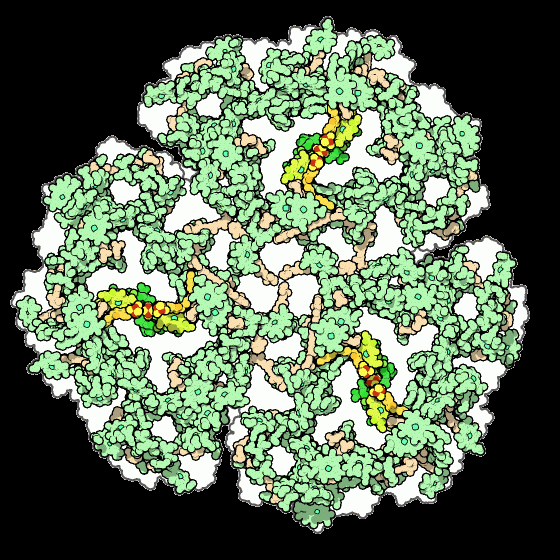"I am, somehow, less interested in the weight and convolutions of Einstein’s brain than in the near certainty that people of equal talent have lived and died in cotton fields and sweatshops."
Marxist* Biologist
also quite bizarrely close friends with Alan Dershowitz :thinking-about-it:
Not sure if Marxist is a good descriptor. From some descriptions rad lib or socdem might be more accurate
Gould did not openly identify himself as a Marxist nor did he claim to use dialectical reasoning. Nevertheless many features of Gould’s thought are marked by an influence of Marxism and its dialectical approach.
https://www.marxists.org/history/etol/newspape/atc/1054.html
:sadness:
I listened to this talk a while ago and he very much seems to think like one
I'm never a fan of the "kid skips 7 grades and goes to college instead middle school" thing whenever it crops up. Let kids be kids.
I think a lot of people could. But I think there's little-to-no advantage to jumping ahead, and it tends to negatively impact social and emotional development.
I was put in a math class one year above my grade in elementary school. I dropped out after a few weeks because the class skipped morning recess.
I actually work with "profoundly gifted" kids for a living now, and our school strongly advises against skipping grades, and (especially) against graduating early. There are virtually no benefits to doing so, and tons of drawbacks.
Suppose everything goes according to plan, and this kid gets into a physics PhD program next year. Let's say it takes him 5 years (pretty middle-of-the-road) to finish all the coursework, do the original research, and defend his dissertation. Great--now you're 20, and you're on track to get a tenure track job...about ten years early. 25 years down the line, you're 45 and tenured; someone who took the normal track is maybe 55 and tenured. Now you're middle aged and a tenured professor, just like you would have been if you hadn't rushed through. Probably nobody remembers that you were a child prodigy. You likely do good work, but so do all the other people at the top of your field. What did you really gain here? For the privilege of getting to the end of your academic track about a decade early, you sacrificed your whole childhood, all the normal experiences you'd get as a high school, college, and graduate student, and a lot of social development.
We strongly recommend that instead of grade promoting, kids just take classes and do work that they're intellectually ready for. There's no reason why this kid can't stay in high school normally, but also take graduate level math and science courses at the university. This gives him some semblance of a normal life, lets him do work he finds engaging, and doesn't rob him of his entire childhood and early adulthood development.
At least in my experience, it's basically never the kids who want to do this--it's always the parents. The kids just want to learn cool and interesting shit, which they can do while also being allowed to be kids. If they can take classes at an appropriate level in their area of interest, and maybe engage in some research, they're happy. They don't give a fuck if they get called a grad student or not, unless mom and dad have manipulated them into thinking that graduating from high school at 12 is the only thing to make them interesting.
I have never met someone emotionally stable who skipped a year. Parents should just encourage their child to do research and learn on their own if they are excelerated, not jump ahead to where they cannot connect to their peers.
stealing the best years of their life to fast forward to shitty adulthood
independent learning!! I paid attention to about 10% of my classes for my 17 years of education. I'd do homework or read or whatever during class.
on my own time, I'd read, write programs for my calculator, go to museums and zoos, talk with friends and family members (this is definitely an example of privilege--not everyone has the opportunity to just discuss medicine, law, economics, history, politics, etc with experts as part of their upbringing.)
There are also sometimes opportunities to take courses at a local community college alongside regular education, such that you save money on college and get advanced content, but aren't graduating college before 18 and are still spending most of your day alongside developmental peers your own age.
I mean, I mostly thought school was boring as shit, but I think the vast majority of kids feel that way. It wouldn't have occurred to me to blame my parents for school being boring any more than it would have occurred to the average kid to resent or blame their parents for school being boring. I think pretty much every kid ever has gone "ugh, why do I have to spend 13-22 years doing this shit for 6-8 hours a day???"
The education system could and should absolutely be improved in many ways, but I don't think the answer, even in the short term, is to have kids spend less time in the only real communal environment they'll get for their entire lives.
I'll also say that, like most people, I remember a small fraction of what I learned in school. Getting to certain content sooner or getting through content faster wouldn't change the fact that by 25, I had a general base of knowledge, a lot of practice "learning how to learn", and specialized knowledge in my field. As a kid, I didn't really conceptualize forgetting things, since I basically never forgot anything. I knew it would happen. And I worried about it even. But I couldn't really understand what it would be like to have my brain prune unused/underused neural pathways. But it's important because it contributes to the conclusion that more doesn't necessarily equal better.
So, as I'm thinking through this, I could maybe see an argument for accelerating people with truly eidetic memories, because getting through more content will actually result in them knowing more, but that's a very special and rare case. Plus, people with eidetic memories are that much better at independent learning, and also far more likely to need additional social and emotional support that would come from not skipping ahead.
The place I teach is attached to a university, and all the kids are technically university students. They take some classes with us, and then pursue whatever it is that they're incredibly good at with the university. These kids' development tends to be very "spiky:" they'll be (say) doing graduate level math at 14, but only modestly better--and sometimes worse--than their age-peers at literary analysis. Giving them the opportunity to do high level work in their area of strength while also operating in a (relatively) normal high school environment with other kids who are like them is a huge boon, and results in kids who are dramatically less fucked up. We're an unusual school, but we're not singular; the options are out there (we're also public and free).
Did a bit of research dive and I feel bad for the kid. Everything I can find about him looks like the typical child prodigy story of a genuinely bright kid combined with way-too-involved helicopter parents. Just check out this description on his website:
When Elliott isn't immersed in his love of academics, you can find him playing board games with his family, spending time with friends playing games such as Minecraft, Oculus, and Dungeons and Dragons, reading, traveling, and listening to some of his favorite musical artists which includes Steely Dan, The Beatles, and Billy Joel.
There's no way this 13 year olds love for Steely Dan isn't due to some heavy influence from his dad. His parents are in the media a lot, and have raised over $36,500 for his "PHD tuition" (despite being pretty well off) so they clearly have an interest in making their son famous as the next IRL young Sheldon.
Also, there's a surprisingly decent take on the reddit thread about him
Child prodigies often have hard lives. I wish him the best of luck with all his endeavors.
A lot of you are surprised by this but it's true. Many child prodigies don't stay that way. Many plateau and eventually are caught up by their peers as really all they have done is master a skill/field of study quickly. It's impressive when they're very young but when they grow up they really haven't developed further than that and are left behind in many ways socially and sometimes economically. They tend to be under extreme pressure to succeed and do great things while also having very little in common with both their older educated peers and younger same-aged kids. This leaves them to be very awkward and socially outcasted even as adults. Even worse, it's actually not that common for a child prodigy to be genuinely creative in their chosen field of accelerated learning. They don't really grow and discover after reaching their peak and so they don't meet those expectations of "greatness" as they slowly get older and become just some person who is good at a particular skill/subject like plenty of other educated people who went the regular route. Don't get me wrong, I'm not saying it's all doom and gloom for them as there are plenty of practical advantages to be that far ahead when you're young. I just wanted to ramble a bit to shed light that these kids DO have it hard in a lot of ways.
I don't know about anyone else, but my musical tastes at 13 were almost exclusively products of what I listened to in my earlier youth - ie. what my parents listened to. Everything else though, yeah, kid's gonna be messed up, most likely. It's sad.
Same here. I think at 13 I got my first album, Blizzard of Ozz, which was over ten years old at the time.
I think Jethro Tull and Pink Floyd were my two favorite bands at that age. My mom had really good taste in music.
His parents are in the media a lot, and have raised over $36,500 for his “PHD tuition” (despite being pretty well off)
They're grifting - physics/math PhDs are almost all completely funded and have a token stipend. That's doubly true if you are a US citizen so you qualify for DoD grants.
Triply true if you're a fucking child prodigy and bring the department free PR on top of generating research and teaching for just enough to pay rent and buy rice and beans.
Hey, the kid is a genius, so they probably just realized how great the music is and got Danpilled already. They're just 20 years ahead of the natural curve
Maybe his life just has him wanting to DRINK SCOTCH WHISKY
ALL NAIGHT LONG
AND DIE BEHIND THE WHEEL
THERES A NAME FOR THE WINNERS IN THE WORLD
I WANT A NAME WHEN I LOSE
THEY CALL AL-A-BAM-A THE CRIM-SON TIIIDE
CALL ME DEACON BLUES
This is actually surprising, Physics PdD programs almost always funded by teaching (i guess they dont want a 13 year old to teach?) or as a research assistant under your advisor.
I find it ironic that even in the fantasy world of Big Bang theory Sheldon had to go to Germany for his grad studies at 14 …
PhD programs are kinda like jobs in that the university usually pays you. They don't pay well so that students are confined to the like-minded, narrowly professionally apolitically focused social circle they can access in cheap campus housing, but if you are admitted to a PhD program you don't have to pay tuition "out of pocket" in the US.
If you're paying to get a PhD, you are getting scammed. Any reputable program will pay you, and cover your tuition. Granted, the pay is usually dogshit subsistence level (I got about $20,000/yr in New York fucking City), but you should never be paying out of pocket to pursue the degree.
Right lol? You're actually producing things for the University. It's not just classes. The research and teaching has value.
Yeah, the person should just wait. The comments point out the issue is likely that child labor laws prevent them getting a stipend/tuition paid for, since it would have to be either in exchange for working as a TA or GRA.
i really dont think graduating college at such a young age is a huge feat. highschool was mind numbingly boring and easy, would have way preferred going to college during that time but money
plus college basically reteaches you everything you did in highschool anyways. so the first 2 years are boring af as well. if anything this just shows what a joke our education system is
Most phd programs will give you a full ride if you get and have financial need. Are physics PhD programs different?















